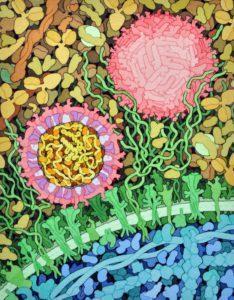Previous studies have shown that Zika virus (ZIKV) persists in certain parts of the body even after the symptoms clear. For example, it has been shown that ZIKV persists in semen. This study, led by Dan Barouch, reveals that ZIKV forms viral reservoirs which allow it to persist in both cerebrospinal fluid (CSF) and lymph nodes (LN). The virus was shown to persistent for weeks in these reservoirs.
In the acute stage of infection, ZIKV symptoms include fatigue and headaches. However, the virus has been linked to abnormalities in infants whose mothers were infected with the virus. The virus can cause other serious conditions in adults such as Guillain-Barré syndrome.
Studies have shown that the virus persists well after it has been expelled from other parts of the body such as peripheral blood and urine. ZIKV has been shown to persist in semen as well as fetal brains and the placenta from infected mothers.
The researchers investigated where else the virus may be creating reservoirs which aid in its persistence. They used non-human primates for their experiments. The researchers injected rhesus monkeys and analyzed different tissue samples over time.
The study revealed that ZIKV cleared in the peripheral blood between 7-10 days post-infection. This clearance was correlated with the presence of neutralizing antibodies which target ZIKV. Interestingly, ZIKV was still found in the CSF up to 42 days post-infection. They also found the virus in the lymph nodes up to 72 days post-infection.
The presence of these viral reservoirs in the CSF and LN was positively associated with pro-inflammatory and anti-apoptotic pathway genes. There was up-regulation of mechanistic target of rapamycin (mTOR). The presence of ZIKV in the CSF may be explained by the inability of neutralizing antibodies to effectively cross the blood-brain barrier. However, that does not explain the persistence of virus in the lymph nodes.
Altogether, these data reveal previously unknown reservoirs for ZIKV. Eliminating these reservoirs may be important as the effect the virus has on the CSF and LN is not well understood and could pose a serious threat to people infected with the virus.
Journal article: Aid et al., 2017. Zika Virus Persistence in the Central Nervous System and Lymph Nodes of Rhesus Monkeys. Cell
Article by Thandeka Moyo












